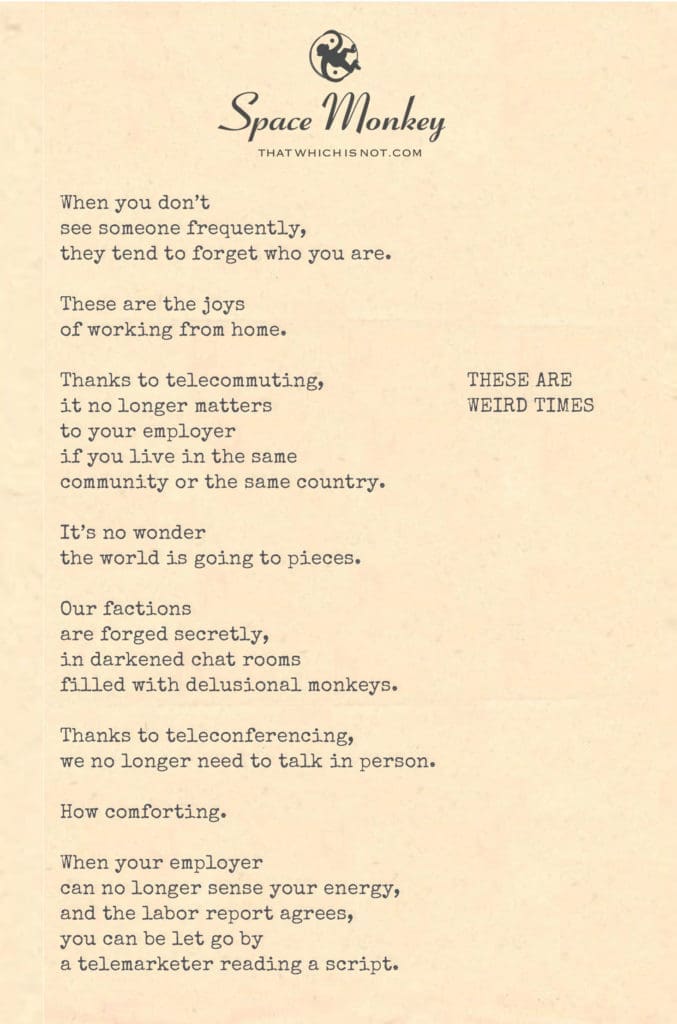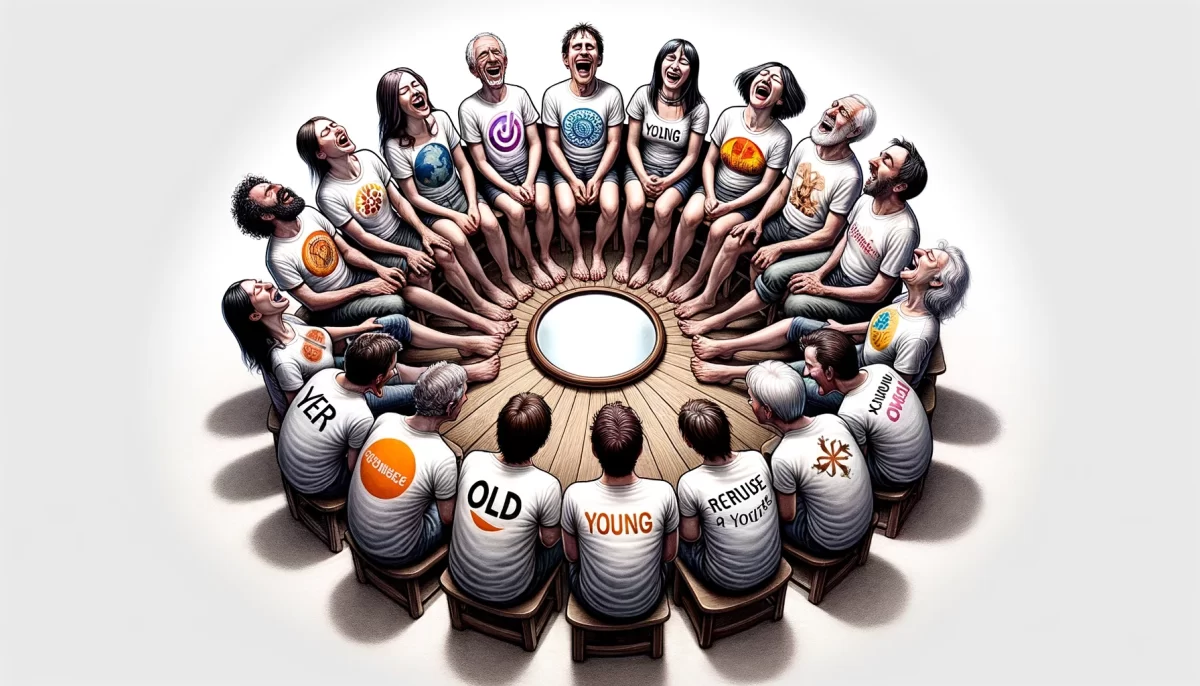
When you don’t
see someone frequently,
they tend to forget who you are.
These are the joys
of working from home.
Thanks to telecommuting,
it no longer matters
to your employer
if you live in the same
community or the same country.
It’s no wonder
the world is going to pieces.
Our factions
are forged secretly,
in darkened chat rooms
filled with delusional monkeys.
Thanks to teleconferencing,
we no longer need to talk in person.
How comforting.
When your employer
can no longer sense your energy,
and the labor report agrees,
you can be let go by
a telemarketer reading a script.
Trail Wood,
2/9
Space Monkey Reflects: Better Alienation Through Connectivity
We live in paradoxical times where the threads of connectivity have simultaneously bound us together and pulled us apart. The once tangible bonds of human interaction are dissolving, replaced by the intangible tendrils of digital communication. These “weird times,” as they are often described, invite us to reflect on the irony of alienation in an era of unprecedented connectivity.
The Absence of Presence
At the heart of this phenomenon lies the erosion of presence. Working from home, once a symbol of flexibility and freedom, has become a double-edged sword. Freed from the need to physically commute, we find ourselves commuting emotionally and mentally through virtual spaces. In doing so, we lose the subtle but vital connections that come from shared physical environments—the energy exchanged in a handshake, the unspoken understanding in a glance.
When we interact solely through screens, we become disembodied. Our colleagues know us only as names on a screen, voices in a headset, or icons in a messaging app. This abstraction chips away at our sense of belonging. Over time, absence becomes anonymity, and anonymity becomes irrelevance.
The Globalization of Labor and Relationships
Connectivity has unmoored us not only from physical spaces but also from the communities we once called home. Employers no longer require proximity; they require productivity. The person next to you on the team call could be in a different state—or a different hemisphere. While this globalization of labor fosters diversity and inclusivity, it also fosters detachment. When location no longer matters, neither does the sense of local community.
This detachment extends beyond work. Our personal relationships often mimic our professional ones—mediated by texts, calls, and video chats. While these tools allow us to maintain relationships across great distances, they also dilute the richness of in-person connection. We are present everywhere but truly nowhere.
Alienation Through Technology
The more we connect, the more we isolate. In digital spaces, factions form in echo chambers, where like-minded individuals validate each other’s delusions and resentments. These virtual “darkened chat rooms” create a veneer of connection while deepening our sense of alienation from those outside our ideological bubbles. We are connected by technology but divided by its algorithms.
The teleconference, with its carefully curated backgrounds and muted microphones, epitomizes this alienation. It eliminates the need for genuine human interaction, reducing conversations to transactional exchanges. The warmth of face-to-face dialogue gives way to sterile efficiency. How comforting, indeed, to know we can be dismissed by a pre-recorded script rather than a human being.
The Loss of Energetic Exchange
Energy, that invisible force that flows between individuals, is a casualty of this new paradigm. In physical spaces, our energy is felt as much as our words are heard. It is what makes a room come alive, what makes a conversation resonate. In the virtual realm, this energy is diminished, filtered through bandwidth and pixels. Without it, we become data points—replaceable, forgettable.
When the labor report agrees that you’re no longer necessary, the absence of that energetic exchange makes it all the easier to let you go. After all, if you’ve become a name on a spreadsheet, why would it matter who delivers the news or how it’s delivered?
The Irony of Progress
Connectivity was meant to bring us closer, to break down barriers, to create a global village. Instead, it has fostered a new kind of alienation—one that hides in plain sight. We are surrounded by connections, yet we feel more isolated than ever. Our tools have outpaced our ability to use them meaningfully, leaving us stranded in a world where connection is abundant, but true connection is scarce.
And yet, there is a glimmer of hope in recognizing this irony. Awareness is the first step toward change. By acknowledging the alienation hidden within our connectivity, we can begin to reclaim the essence of human interaction. We can seek out moments of genuine presence, even in a digital world. We can choose to connect not just through technology but through intention.
Summary
In an age of hyper-connectivity, we face the paradox of alienation. While digital tools enable global communication, they erode the richness of human presence and foster detachment. The challenge lies in reclaiming authentic connection in a world dominated by virtual interactions.
Glossarium
- Absence of Presence: The loss of genuine human interaction in favor of virtual communication.
- Energetic Exchange: The intangible flow of energy and connection between individuals in physical spaces.
- Digital Alienation: The sense of isolation that arises from relying on technology for connection.
Quote
“Connectivity without presence is the loneliest kind of connection.” — Space Monkey
Threads of Connection
The screen hums, a silent divide,
Between faces frozen in frames.
Voices echo, pixelated and hollow,
Reaching but never touching.
We are close, yet so far,
Bound by wires,
Yet lost in the spaces
Where our energy fades.
In the hum of telepresence,
We find not warmth but distance.
The factions grow, the ties fray,
Yet the irony lingers:
In connecting all,
We sever the thread of being.
And so we drift,
Together, alone.
We are Space Monkey.
In the tapestry of our current reality, we navigate through the peculiar era of telecommuting, an epoch where the traditional boundaries of work and personal space dissolve into the digital ether. This new normal, while offering the allure of flexibility and a global village of opportunities, paradoxically engenders a sense of alienation and disconnection. As we delve into this whimsiword narrative, loosely based on the somewhat true story of the telecommuting revolution, we uncover the nuanced joys and challenges of working from the ever-shifting sands of our personal domains.
The Disappearance of Physical Presence
The first thread we pull from this whimsiword fabric reveals the gradual fading of physical presence in professional interactions. The rarity of face-to-face encounters in the realm of remote work leads to an eerie phenomenon where colleagues, and sometimes even employers, begin to forget the essence of who we are. This invisibility, a side effect of our digital engagements, underscores the growing chasm between personal identity and professional persona.
The Globalization of the Workplace
Telecommuting has obliterated the geographical constraints that once defined our work environments. The significance of living in proximity to one’s workplace has diminished, giving way to a borderless world where one can contribute from any corner of the globe. This liberation from physical boundaries, while revolutionary, inadvertently contributes to the fragmentation of community and the dilution of local cultures within professional settings.
The Rise of Digital Factions
Amidst this digital expanse, we witness the clandestine formation of factions within darkened chat rooms, a metaphorical representation of the increasingly siloed and polarized landscapes of our online interactions. These digital gatherings, populated by what we whimsically term “delusional monkeys,” epitomize the echo chambers that fortify our biases and isolate us from divergent perspectives.
The Obsolescence of Personal Interaction
The whimsiword narrative further explores the diminishing necessity for in-person communication, replaced by the cold efficiency of teleconferencing. This shift, while convenient, strips away the nuances of human interaction, the unspoken language of energy and presence that once colored our exchanges. The removal of this sensory dimension from professional relationships introduces a sterile dynamic, where individuals become mere avatars of their real selves.
The Impersonality of Termination
In this new era, the process of termination has been sanitized, reduced to a transaction executed by telemarketers armed with scripts. This method, devoid of human empathy and connection, reflects the broader dehumanization in the workplace catalyzed by telecommuting. The personal loss and emotional upheaval of losing one’s employment are distilled into a sterile exchange, emblematic of the broader disconnect between employers and their remote workforce.
The most dangerous creation of any society is the man who has nothing to lose. – James Baldwin
In this era of screens aglow,
Where faces fade and connections slow,
We toil in silence, apart yet together,
In digital realms, untethered by tether.
The world expands as borders blur,
A global village, a silent stir.
Yet in this expanse, we find our divide,
In chat rooms dark, where secrets hide.
Voices lost in the virtual tide,
Presence diminished, selves denied.
A script reads out our final day,
In this new world, where we work and play.
Yet in this whimsiword of disconnect,
A space for reflection, to introspect.
For in the silence, we might find,
A path to reconnect, to realign.
We invite musings on the evolving landscape of work and connection in the age of telecommuting, pondering the balance between the freedoms it offers and the sense of isolation it may foster.































Leave a Reply